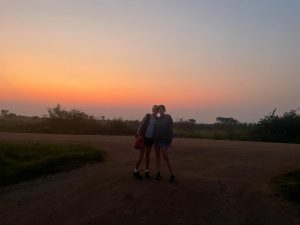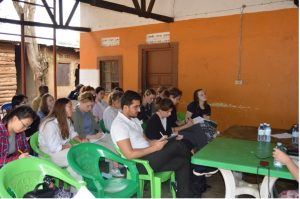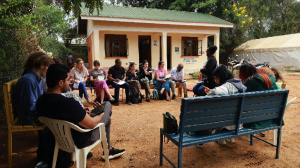Authors: Sophie Lennox and Holly Vipond, postgraduate students at University of Manchester (UoM), who attended a research visit to Uganda as part of the HCRI module ‘Humanitarianism and Displacement’ (HCRI 60061)
Photography credits: Tapiwanashe James, En Xi Lim, Sophie Lennox, Holly Vipond – All UoM postgraduate students

Research trip in Uganda, January 2023
Prior to embarking on our research trip to situations of displacement in Uganda, both of us were asked to write a literature review as an assignment and coincidentally picked topics with a mental health focus. This is an important issue which we see increasingly being brought to the forefront of conversations. Yet, the academic literature on Uganda and indeed across wider Africa suggested that these everyday conversations were not being had (Bapolisi et al, 2020). Much of mental health literature conducted on Africa is overwhelmingly generalised and ignorant to suffering communities (White et al., 2017). PTSD seems to be the overarching term used in relation to mental health of refugees in Africa whereas common mental health disorders such as depression and anxiety are dismissed, or at the very least, undervalued (Turrini, et al., 2017). Much of the Western-based literature that formed our knowledge prior to being placed in the field suggested that this was due to cultural norms and a lack of acknowledgement of mental health and the importance of well-being (Pacione, et al, 2013). Inevitably, going into the field, both of us anticipated that mental health was going to be a taboo subject, particularly within fragile settings concerning both Ugandans and the refugee community.
As first-time researchers, our expectations and our preparation, which was based on predominantly Western academic literature, were entirely different to the reality of conducting research. Whilst our trip was not based on yielding results from the individuals we spoke with to compile a report, we were there to engage with local community organisations and gain an insight on the relationships between the Ugandan host community and the refugees.

Interview focus group at a refugee settlement
Our primary research was conducted through interviews with various groups throughout locations across Uganda. One particular group we spoke to stood out as a memorable conversation due to the willingness of participants to be honest and open regarding their experiences living as refugees with mental health. Some of the challenges they faced were stark. One participant spoke candidly of juggling life as a refugee, a student, a businessman and someone facing everyday acts of discrimination. This correlates with Logie et al. (2020, p.11) who found safety concerns have been associated with depressive symptoms, in part due to social isolation and mistrust. A female interviewee we spoke with discussed the mental health hardships that she had experienced. She openly discussed her long-term mental health battles and the impact this had on herself and others around her. Whilst this was difficult to hear, the participant was actively wanting to tell us her story. She went on to discuss how through social media platforms such as TikTok she had come to recognise her battles as a legitimate illness. She described how within the city she now resides in, she has been met with more acceptance and is now able to access her healthcare needs. This highlighted to us the presence of contradictions in narratives around mental health. Conversations and awareness were happening within the field in what seemed like a casual way, on something the literature suggested was a totally taboo topic.
The narratives we had previously understood gave us damaging preconceived notions that mental health is not spoken about and, in many cases, it is seen as witchcraft or non-African to be concerned with invisible illnesses (White and Van de Boor, 2021). However, in reality, some of this literature is reinforcing ‘them vs us’ power dynamics that date back to colonial eras. The people of Uganda and the refugees that reside within the state are far from passive, they have agency and invoke a willingness to make changes in their lives. One participant we spoke to referred to social media platforms in relation to her business entrepreneurship ideas. She spoke excitedly of their productive influence on her business, highlighting to us both the positive impact of social media platforms that promote female empowerment, but also the agency that so many people that we spoke to enjoyed. It was clear to us that transnational influences and platforms like TikTok have the potential to reinforce positive mental attitudes and promote good well-being practices. It was so nice to see that social media platforms are an accessible force for good and are used to directly benefit people and validate their mental health illnesses as something to not be ashamed of. On the ground, it felt as if conversations regarding mental health were not as negative, taboo or unrelatable as we had initially thought. The literature regards mental health as a Western discussion and practice when, in reality, so many participants we interviewed were open and honest about their struggles with mental health. Essentially, informal conversations help to enhance data and provide intelligence into the reality of individuals’ experiences and perceptions (Swain and King, 2022, p. 8). Having relaxed discussions within interview and general conversation was where we gained the most valuable insight. Giving participants agency to openly discuss the topics they wished to share allowed for open and honest dialogue to take place.

Another focus group with a settlement leader
Reflecting upon our trip to Uganda and our experiences within the context of research, it was eye opening to see the contrast between expectation and reality. On a personal level, both of us agreed that the most important and influential conversations – both formal and informal – that we had were those that were personable and relatable. As the trip progressed, we became more aware of the fact that not having solely academic driven conversations was important in building relationships and giving participants greater agency to discuss the topics they wished. The realisation that not every conversation has to be a knowledge extraction felt relieving. In such a highly monitored environment those casual and intimate conversations provided us with the most perspective. Some degree of rigidity is inevitable when conducting research but learning to navigate this, both in approach and through conversation, is important. As we have discussed, providing the space for people to free flow in their thoughts creates a diversity in perception that is not otherwise always possible when using an academic framework. Our positionality, and the participants’ perceptions of us as researchers, i.e. female researchers, international student researchers and researchers from different faiths and beliefs, shaped the information we were given and the extent to which we were able to have meaningful discussions. For example, one of our students was fluent in Arabic, whilst others were from countries such as Zimbabwe, China, and Japan. This is the clear benefit of a Masters level group research visit; students come from vastly different backgrounds and disciplines.
Although there are inherent problems with a large group of first time Western scholars going into the field without prior interview experience or much preparation, there can also be positive outcomes. Trips like these allow us to reflect and create room for changes in perception in our own lives and within academic settings. For future researchers, it is important to remember to have a human face and patience with your participants and the other researchers involved. Approaching the field with empathy, a lack of judgement, and flexibility within situations enables productive and meaningful outcomes. We wish to reinforce the importance of research trips to not be based on getting the answers that match with prior research or hypotheses, but to gain truthful insights and lived experiences of those on the ground whilst also navigating their boundaries. Based upon our own reflections, it is really important when having emotionally charged discussions to also ensure that you cater to your own well-being and acknowledge that downtime is crucial to deter burnout.

Enjoying downtime seeing some amazing wildlife
References:
Bapolisi, A et al. (2020) Post-traumatic stress disorder, psychiatric comorbidities and associated factors among refugees in Nakivale camp in southwestern Uganda. BMC Psychiatry, 20(1), pp. 1-10.
Logie, C.H., Okumu, M., Mwima, S. et al (2020) Contextual factors associated with depression among urban refugee and displaced youth in Kampala, Uganda: findings from a cross-sectional study. Confl Health 14, 45.
Pacione, L., Measham, T. & Rousseau, C. (2013) Refugee Children: Mental Health and Effective Interventions. Curr Psychiatry Rep, 15(341), pp.1-9.
Swain, J., & King, B. (2022). Using Informal Conversations in Qualitative Research. International Journal of Qualitative Methods, 21.
Turrini, G et al. (2017) Common mental disorders in asylum seekers and refugees: Umbrella review of prevalence and intervention studies. International Journal of Mental Health Systems, 11(1), pp.1-14.
White, R., Jain, S., Orr, D. & Read, U. (2017) The Palgrave Handbook of Sociocultural Perspectives on Global Mental Health. London:Palgrave Macmillan UK.
White, R. & Van der Boor, C. (2021) Enhancing the capabilities of forcibly displaced people: a human development approach to conflict- and displacement-related distressors. Epidemiology and Psychiatric Sciences, 30(e34), pp.1-8.
